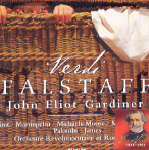The Long March of period conductors through the later repertory continues, leaving a wrecked and devastated Romantic-era musical landscape. The latest victim is Verdi, the 100th anniversary of whose death is here commemorated with a recording that lays waste to the ripest fruit of his Indian summer, his last opera, Falstaff. Taking his cue from its enlarged orchestral role, conductor John Eliot Gardiner trumps the composer by relegating the singers to a secondary position and literally placing the orchestra center-stage. As Gardiner says in the booklet interview, “My idea was to arrange the orchestra center-stage with the action taking place all around it, in front and behind it. . .” Too bad Verdi didn’t think of that, but then, he thought he was writing an opera.
Gardiner, like others of his ilk, makes much of the uniqueness of instruments of Verdi’s time, but whatever relevance that may have to music of earlier periods, the effects here are minimal. Unfortunately, the engineers are in total compliance with Gardiner’s views so we get a skewed aural picture dominated by the orchestra with the singers in the background. At normal volume levels, large swathes of the music disappear into the ether; at higher volume settings, the orchestral climaxes will blast you from your listening seat. Such unnatural sound complements Gardiner’s exaggerated dynamics and exacerbates the hard, steely edge he brings to the score. Gardiner may think his conducting conveys the frothy, quicksilver nature of the music but it actually makes Verdi’s humane masterpiece sound unyielding and aggressive. It’s an example of conductorial ego crushing art.
What about the singers? They’re hand picked by Gardiner to fit his conception of the work so, like most of his recordings, you won’t find great voices here. Jean-Philippe Lafont may be an adequate Falstaff on stage, but he brings no special insights to the role; and his sizeable, warm voice is nowhere near the quality needed in a true Verdi baritone, lacking ease in top notes and tonal thrust. Time and again I played Falstaff’s scenes from this recording alongside the equivalent scenes in the classic performances of Karajan on EMI (with Gobbi’s Falstaff) and Toscanini’s on RCA (with Valdengo). It was like comparing a sidewalk hot dog to a gourmet meal. Similar observations hold for the rest of the cast, decent singers all, but with nary an individual touch to their portrayals. Again, spot-checking random scenes against their counterparts in the Toscanini and Karajan recordings made returning to the Gardiner an unpleasant chore. Most telling is the moonlit Windsor Park scene, moving in the earlier recordings, flat in the Gardiner. A section of the booklet notes is titled “Sir John [Falstaff] Meets Sir John” [Gardiner]. They shouldn’t have met. Buy this one to give to your enemies.
































